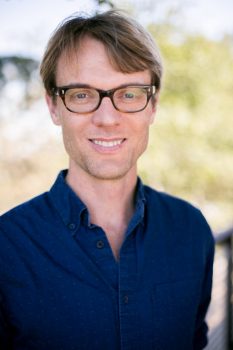Andrew Chignell is the Next Speaker in the Mudd Lecture Series Andrew Chignell, a professor at Princeton University, will give a lecture on Oct. 28 at 5 p.m.
Andrew Chignell, Laurance S. Rockefeller Professor of the University Center for Human Values, Religion and Philosophy at Princeton University, will give a lecture on Oct. 28 at 5 p.m. as part of Washington and Lee University’s Mudd Center for Ethics series on “Daily Ethics: How Individual Choices and Habits Express Our Values and Shape Our World.”
Chignell’s lecture, which is free and open to the public, is titled “What to Do When You Don’t Make a Difference.” The event will take place at the Stackhouse Theater, and tickets are not required. The lecture will also be available to watch via Livestream here.
The talk will address the role of individual choices in situations that require large-scale collective action to bring about actual change. In his lecture, Chignell will explore ways one can make a difference without personal decisions acting as a burden on their moral resolve.
“Andrew Chignell will help us to apply a moral reasoning approach to the question of why to express our values through our daily behaviors, even if our actions make only the tiniest ripple within the universe,” said Karla Murdock, director of the Mudd Center. “Why should we care about behaving in a way that is consistent with our morals, even when it is difficult, and even when we’re not sure it will matter? How can we reason through these decisions?”
Chignell earned his doctorate in philosophy and religious studies from Yale University. His work focuses on the moral psychology of hope and despair, food ethics and philosophy of religion. Chignell is widely published in peer-reviewed outlets. He has also co-edited five volumes, including most recently “Evil: A History” and “Philosophy Comes to Dinner: Arguing about the Ethics of Eating.” He collaborated with a colleague at Cornell University to create an “Ethics of Eating” course that is now available as a MOOC on edX.org.
In the public domain, Chignell was the project co-director of the cross-disciplinary Hope & Optimism project, a four-year, $5 million dollar grant effort that brought together philosophers, psychologists, sociologists, scholars of religion and artists of stage and screen to explore the theoretical, empirical and practical dimensions of hope, optimism, despair and pessimism in human life.
Chignell’s work also focuses on 17th- and 18th-century philosophy. He is currently working on three books about Kantian philosophy and is project director for the Princeton Project in Philosophy and Religion and president of the North American Kant Society.
The Mudd Center was established in 2010 through a gift to the university from award-winning journalist Roger Mudd, a 1950 graduate of Washington and Lee. By facilitating collaboration across traditional institutional boundaries, the center aims to encourage a multidisciplinary perspective on ethics informed by both theory and practice. Previous Mudd Center lecture series topics have included Race and Justice in America, The Ethics of Citizenship, Markets and Morals, Equality and Difference, The Ethics of Identity and The Ethics of Technology.
For more information and a complete schedule of events, visit the Mudd Lecture Series webpage.
 Andrew Chignell
Andrew Chignell
You must be logged in to post a comment.